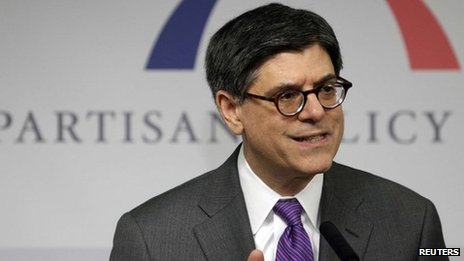http://www.bbc.co.uk/news/world-us-canada-26021640
3 February 2014 Last updated at 13:12 ET
Jack Lew: US could default on debt by 'end of month'

Mr Lew said now was not the time to cut the US government's budget dramatically
Continue reading the main story
US debt ceiling
- US debt talks
- Q&A: Shutdown
- Q&A: Default
- Will they ever learn?
US Treasury Secretary Jack Lew has warned the US may default on its debt by the end of the month if Congress does not raise its borrowing limit.
Mr Lew said he could rely on emergency measures to pay US debts after the limit is reinstated on 7 February.
But he anticipated the treasury's reserves would quickly be exhausted as it issues annual income tax refunds.
Congress suspended the debt limit in October as part of a deal to reopen the federal government after a shutdown.
The $16.7tn (£10.2tn) cap will be reinstated on Friday.
"Without borrowing authority, at some point very soon, it would not be possible to meet all of the obligations of the federal government," Mr Lew said at the Bipartisan Policy Center in Washington on Monday.
The treasury secretary said the US treasury department could resort to accounting mechanisms to avoid breaching the limit until the end of February.
But soon after, the US will only be able to pay its debt and other obligations with cash on hand.
And in the spring, Mr Lew noted, the US issues tax refunds to Americans who overpaid income taxes last year, straining its cash reserves.
While Republicans have in the past demanded budget cuts in return for agreeing an increase in the borrowing limit, the party's leaders have signalled reluctance to do so this time around.
Long-term fiscal challenges
In any case, the White House has said it will not negotiate budget policy in exchange for raising the debt limit.
And Mr Lew argued that dramatically cutting back on the federal government's spending was unnecessary for the moment.
"I'm not sure this is the year for the long-term fiscal challenge to be dealt with," he said, adding the US deficit had been declining. "I actually believe that we've made so much progress in the short and medium term, we have a little time to deal with the longer term."
During the partial government shutdown in October, Republican lawmakers threatened to block a rise in the debt limit unless the Democrats agreed to undermine or repeal President Barack Obama's signature healthcare reform law.
In 2011, the Republicans won reductions in US government spending in return for agreeing to raise the limit.
Now, the debt limit debate returns to the fore as the Democrats and Republicans appear to have called a momentary truce in their long-running budget fight.
Cross-party negotiations in Congress in December and January yielded a two-year federal budget.
More on This Story





